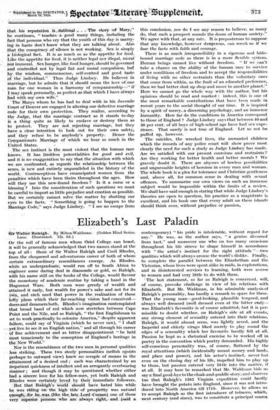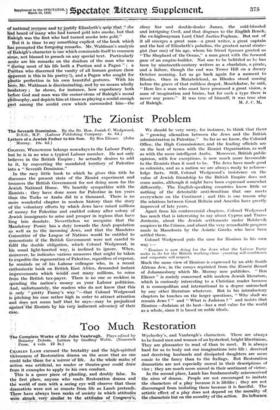Elizabeth's Last Paladin
OF the roll of famous men whom Oriel College can boast, it will be generally -acknowledged that two names stand at the top of all : those of Sir Walter Raleigh and Cecil Rhodes, from-the chequered and adventurous career of both of whom certain extraordinary resemblances emerge. As Rhodes, while an undergraduate, would run off to South Africa to engineer some daring deal in diamonds or gold, so Raleigh, with his name still on the books of the College, would flavour the monotony of academic routine by taking a hand in the Huguenot Wars. ' 'Both .men were greedy of wealth and attained it early, but wealth for power's sake and not for its 6Wri, and each used that power in the realization of those lofty' '` Plans which their far-reaching vision had conceived— doers and dreamers both. Rhodes's imagination contemplated that broad band of red which now stretches between Cape Point and the Nile, and so Raleigh, " the first Englishman to set to worlupractically. to_colonize America," despite apparent failure, could say of Virginia (which he never saw), " I shall yet live to see it an-English nation," and all through his career of fine achievement and as bitter disappointment " he held most tenaciously to the conception of England's heritage in the New World."
Nor is the resemblance of the two men in personal qualities less striking. These two steely personalities (selfish egoists perhaps' to outward view) knew no scruple of means in the attainment of a desired end ; each was characterized by an impatient quickness of intellect and an arrogantly overbearing manner ; and though it may be questioned whether either had a sincere love for his fellow-men; yet both Raleigh and Rhodes were certainly lovedby their immediate followers.
But that Raleigh's world'should itat';e hated him while he was riding On the high 'tide' of prosperity was natural enough, for he-w4S- (like the; kite,-.Lonl--Cur7.9n) one of those very superior persons who are always right, - and. (said a. contemporary) " his pride is intolerable, without regard for any." He was, as the author, says, " a genius divorced from tact." and moreover one who on too many occasions throughout his life strove to' shape himself in accordance with " the artist's instinct for the right attitude "—two qualities which will always arouse the world's dislike. Finally, to complete the parallel between the Elizabethan and the Victorian, whose lives were spent alike in raids, in explorations, and in disinterested services to learning, both were averse to women and had very little to do with them.
' The last statement, so far as Raleigh is concerned, will, of course, provoke challenge in view of his relations with Elizabeth. But Mr. Waldman, in his admirable analysis of Raleigh's personality, has hardly a remark to spare for these. That the young man—good-looking, plausible tongued, and always well dresssed (well dressed even at the bitter end)— was Elizabeth's favourite is of course admitted; but it is per- missible to doubt whether, on Raleigh's side at all events, any strong element of sexuality entered into their relations. Raleigh, it would almost seem, was lightly sexed, and the Imperial and elderly virago liked merely to play round the edges of a sensuality which her favourite hardly felt at' all. Passion he kept as a rhetorical exercise to be worked off in poetry in the convention which poetry demanded.- His highly self-conscious personality was, of course, flattered by the royal-attentions (which incidentally meant money and lands, and place and power), and his actor's instinct, never lost even on the closing day of his life, impelled him to play up to them, but passion entered very little into the matter, if at all. It may here be remarked that Mr. Waldman bids us say a final good-bye to-the cloak-and-puddle story, and observes too that Raleigh's 1585 Virginia expedition could hardly have brought the pbtato into England, since it was not intro- duced into North America till 1719. However, he allows us to accept Raleigh as the first introducer of tobacco, which, :next century (and since), was to constitute a principal source of national- reVqnife ma-to-justify -Elizabeth's quipthat She had heard of many who had turned gold into smoke, but that Raleigh was the first who had turned smoke into gold." But it is time to say something explicit of the book which has prompted the foregoing remarks. .-Mr.-Waldman's analysis Of Raleigh's character is one which commends itself to common sense, not biassed to preach on any special text. ParticularlY acute are his remarks on the dualism of the man who was `t during most of his life both a Puritan and a Pagan " ; a Piir'itan who discerned the vanity of all human gesture (hoW apparent is this in his poetry I), and a Pagan who sought -for plaStic perfection in his own beautiful gestures. With his herb, Mr. Waldman is disciiminiting,'andhy no means wholly laudatory ; he shows, for instance, hoW expediency both *fine God and man was the corner-Stone of Raleigh's moral 'hilosophy, and depicts him at times as playing a sordid enough part among the sordid crew which surrounded him—the • slimy liar and double-dealer James, the cold-blooded and intriguing Cecil, and that disgrace to the English Bench,' the ex-highwayman Lord Chief Justice Popham. But out of it all emerges a great man—a great writer, a great captain and the last of Elizabeth's paladins, the greatest naval strate- gist (bar one) of his age, whom his friend Spenser greeted as "The Shepherd of the Ocean," a man great with the forward gaze of an empire-builder. Not one to be belittled as he has been by nineteenth-century writers as a charlatan, a pirate, and a failure, though the end was Tower Hill on a dreary October morning. Let us go back again for a moment to Rhodes. Once in Matabeleland, as Rhodes stood musing before the grave of that ruthless despot, Moselekatse, he said, " Here lies a man who must have possessed a great vision, a man of imagination and brains, but for such a type there is never any peace." It was true of himself, it was true also



























































 Previous page
Previous page